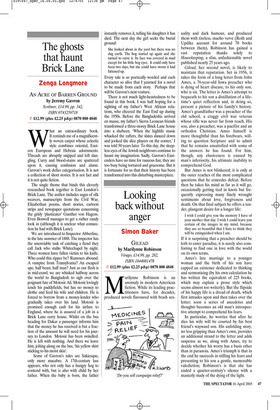Looking back without anger
Simon Baker
GILEAD by Marilynne Robinson Virago, £14.99, pp. 282, ISBN 1844081478 ✆ £12.99 (plus £2.25 p&p) 0870 800 4848 Marilynne Robinson is an anomaly in modern American fiction. While its leading practitioners have, for decades, produced novels flavoured with brash sex uality and dark humour, and produced them with tireless, macho verve (Roth and Updike account for around 70 books between them), Robinson has gained a vast reputation thanks solely to Housekeeping, a slim, unfashionable novel published nearly 25 years ago.
Gilead, her second novel, is likely to maintain that reputation. Set in 1956, it takes the form of a long letter from John Ames, a 76-year-old Iowa preacher who is dying of heart disease, to his only son, who is six. The letter is Ames’s attempt to bequeath to his son a distillation of a lifetime’s quiet reflection and, in doing so, present a picture of his family’s history. Ames’s grandfather was a preacher of the old school, a craggy civil war veteran whose rifle was never far from reach. His son, also a preacher, was a pacifist and an orthodox Christian. Ames himself is more thoughtful than his forebears, willing to question Scripture and to admit that he remains unsatisfied with some of the answers he has found. For him, though, any elusiveness is caused by man’s inferiority, his ultimate inability to comprehend God.
But Ames is not blinkered; it is only at the outer reaches of the most complicated questions that he concedes defeat. Before then he takes his mind as far as it will go, occasionally getting tied in knots but frequently expressing many finely wrought sentiments about love, forgiveness and death. On that final subject he offers a tender, plangent desire for a longer life:
I wish I could give you the memory I have of your mother that day. I wish I could leave you certain of the images in my mind, because they are so beautiful that I hate to think they will be extinguished when I am.
If it is surprising that a preacher should be loth to enter paradise, it is surely also comforting to find one in love with the world on its own terms.
Ames’s late marriage to a younger woman and the birth of his son have capped an existence dedicated to thinking and sermonising (by his own calculation he has written the equivalent of 225 books, which may explain a prose style which seems almost too writerly). But the flipside of his happy life is a dread of death, which first intrudes upon and then takes over the letter; soon a series of anecdotes and thoughts becomes an old man’s introspective attempt to comprehend his fears.
In particular, he worries that after he dies his wife will be courted by his best friend’s wayward son. His unfolding story, no less gripping than Ames’s own, provides an additional strand to the letter and adds suspense as we, along with Ames, try to decide whether his worry has a basis other than in paranoia. Ames’s triumph is that in the end he succeeds in stifling his fears and presenting to his son a gentle, memorable valediction; Robinson’s is that she has ended a quarter-century’s silence with a masterly study of the dying of the light.
























































 Previous page
Previous page